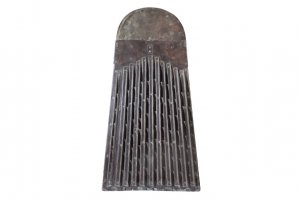Dough bowl
The Dough bowl is a wooden structure with partitions in which the dough is placed to rise before baking according to the traditional way of making bread. The dough bowls can be either elongated pieces of wood on which grooves have been carved depending on its length, or by joined pieces of wood that form corresponding sockets. The wood that was used for the construction was usually pine. In addition to the dough bowl, other cooking vessels were used for the placement and raising of the dough after kneading, such as small shallow baskets, braided from willow or wicker wood, wooden dishes, and flat boards.
Both in dough bowls and in the other vessels a long narrow cotton cloth, was placed and was sprinkled with flour so that the dough ,would not stick, and then the kneaded breads were placed on them, covered with the remaining cloth and left at room temperature until they rose. After they had risen they were carefully placed on a shovel which was also sprinkled with flour and baked in wood ovens. The bread of the dough bowl we see even today is made of the simplest ingredients: flour, sourdough, water and salt. It is the result of slow and natural maturation and is distinguished for its quality, excellent flavor and its aroma.


